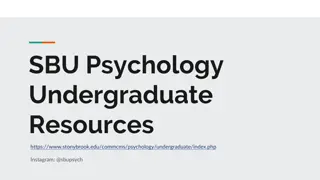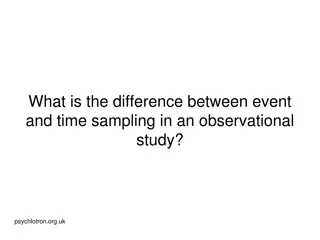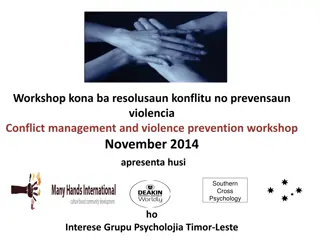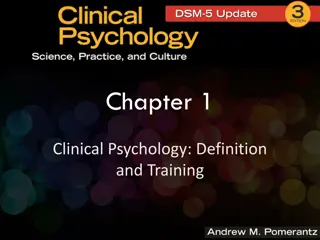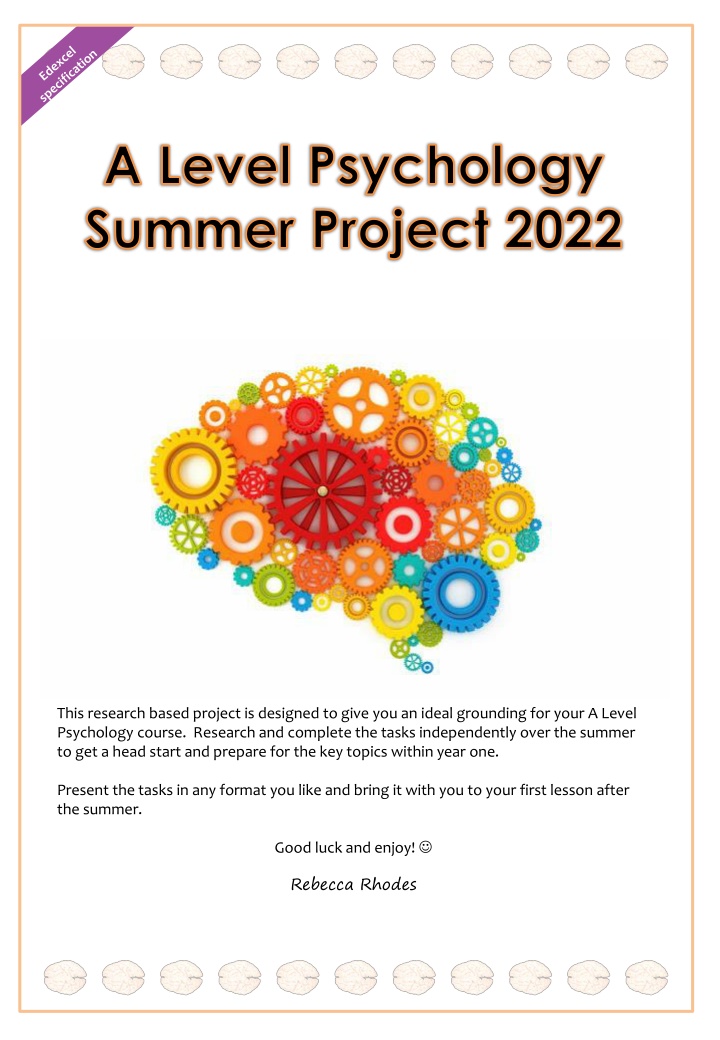
Comprehensive Overview of A-Level Psychology Courses and Assessments
Explore the detailed structure and assessment formats of A-Level Psychology courses, covering topics such as Social Psychology, Cognitive Psychology, Biological Psychology, Learning Theories, Clinical Psychology, and Criminological Psychology. Get insights into exam sections, question types, marking schemes, and available resources for Edexcel A-Level Psychology students. Prepare effectively with this comprehensive guide.
Download Presentation

Please find below an Image/Link to download the presentation.
The content on the website is provided AS IS for your information and personal use only. It may not be sold, licensed, or shared on other websites without obtaining consent from the author. If you encounter any issues during the download, it is possible that the publisher has removed the file from their server.
You are allowed to download the files provided on this website for personal or commercial use, subject to the condition that they are used lawfully. All files are the property of their respective owners.
The content on the website is provided AS IS for your information and personal use only. It may not be sold, licensed, or shared on other websites without obtaining consent from the author.
E N D
Presentation Transcript
http://beenhakkerlab.pharm.virginia.edu/wordpress/wp-content/uploads/2012/04/brain-border.pnghttp://beenhakkerlab.pharm.virginia.edu/wordpress/wp-content/uploads/2012/04/brain-border.png A Level Psychology Summer Project 2022 https://lh3.googleusercontent.com/-EAGN_NUbWik/UsVItM2VghI/AAAAAAAAAII/x1JQWFgp4jU/s630-fcrop64=1,07903904ff6ac665/Brain%2BLarge%2BBorder.jpg This research based project is designed to give you an ideal grounding for your A Level Psychology course. Research and complete the tasks independently over the summer to get a head start and prepare for the key topics within year one. Present the tasks in any format you like and bring it with you to your first lesson after the summer. Good luck and enjoy! Rebecca Rhodes http://beenhakkerlab.pharm.virginia.edu/wordpress/wp-content/uploads/2012/04/brain-border.png
http://beenhakkerlab.pharm.virginia.edu/wordpress/wp-content/uploads/2012/04/brain-border.pnghttp://beenhakkerlab.pharm.virginia.edu/wordpress/wp-content/uploads/2012/04/brain-border.png The Edexcel Course A Level Year 1 Overview of content Topic 1: Social psychology Topic 2: Cognitive psychology Topic 3: Biological psychology Topic 4: Learning theories Overview of assessment Written examination. Students must answer all questions from five sections. Sections A D total 70 marks and comprise mixed question types, including stimulus and data response, short-answer and extended response questions and cover the topic areas as follows: Section A: Social psychology Section B: Cognitive psychology Section C: Biological psychology Section D: Learning theories Section E: Issues and debates has 20 marks and comprises two extended response questions, covering the topic area of issues and debates in psychology. The assessment is 2 hours long. The assessment consists of 90 marks. The formulae and statistical tables given in Appendix 4: Formulae and statistical tables will also be given in the paper. Calculators may be used in the examination. http://beenhakkerlab.pharm.virginia.edu/wordpress/wp-content/uploads/2012/04/brain-border.png
http://beenhakkerlab.pharm.virginia.edu/wordpress/wp-content/uploads/2012/04/brain-border.pnghttp://beenhakkerlab.pharm.virginia.edu/wordpress/wp-content/uploads/2012/04/brain-border.png The Edexcel Course A Level Year 2 Overview of content Topic 5: Clinical Psychology Topic 6: Criminological Psychology Overview of assessment Written examination. The paper is composed of two sections. Students must answer all questions from Section A and all questions from a choice of three optional topic areas in Section B. Section A has 54 marks and comprises of mixed question types, including data and stimulus response, short-answer and extended response questions with a 20-mark response covering the topic area of clinical psychology. Section B presents students with a choice of one from three optional topic areas Criminological psychology, Child psychology or Health psychology. Each section totals 36 marks and comprises mixed question types, including stimulus and data response, short-answer and extended response questions. The assessment is 2 hours long. The assessment consists of 90 marks. The formulae and statistical tables given in Appendix 4: Formulae and statistical tables will also be given in the paper. Calculators may be used in the examination. http://beenhakkerlab.pharm.virginia.edu/wordpress/wp-content/uploads/2012/04/brain-border.png
http://beenhakkerlab.pharm.virginia.edu/wordpress/wp-content/uploads/2012/04/brain-border.pnghttp://beenhakkerlab.pharm.virginia.edu/wordpress/wp-content/uploads/2012/04/brain-border.png The Edexcel Course A Level Year 2 Overview of content Topic 9: Psychological Skills Overview of assessment Written examination. Students must answer all questions from three sections. Section A has 24 marks and comprises mixed question types, including stimulus and data response and short-answer questions, covering the topic area of research methods. Section B has 24 marks and comprises mixed question types, including stimulus and data response and short-answer questions based on psychological studies and one extended response questions based on classic studies given in Topics 1-5. Section C has 32 marks and comprises two extended response questions, covering the topic area of issues and debates in psychology. The assessment is 2 hours long. The assessment consists of 80 marks. The formulae and statistical tables given in Appendix 4: Formulae and statistical tables will also be given in the paper. Calculators may be used in the examination. http://beenhakkerlab.pharm.virginia.edu/wordpress/wp-content/uploads/2012/04/brain-border.png
http://beenhakkerlab.pharm.virginia.edu/wordpress/wp-content/uploads/2012/04/brain-border.pnghttp://beenhakkerlab.pharm.virginia.edu/wordpress/wp-content/uploads/2012/04/brain-border.png Task 1, Topic 1: Anti-social behaviour and prejudice Mini Experiment: Use as many participants as you like who are over 18 and have given their permission to be involved in a study investigating how we respond to perceived attractiveness in others. You will need to print the cards and label them, and print enough questionnaires as you need (one per participant) Read standardised instructions and consent wording to your participants Assign your participants randomly to one of four groups (try to get the same number of participants in each group to make it a fair test):- Group 1, 2, 3 or 4 depending on which card you give them Once they have read the card, give them the questionnaire Read debrief wording Find the middle point of each line and collate your data by noting down which side of the line has been favoured, e.g. further towards likely would be a likely response. Now count how many responses are towards the left descriptors and which are to the right. You should be able to label each questionnaire according to whether behaviour has been rated favourably or not by adding up the ratings and picking the most common e.g. participants more often rate towards the right which would be favourable. For each group, note down how many questionnaires emerged as favourable and how many were unfavourable Compare groups 1 with 2, and groups 3 with 4. We expect to find more favourable ratings in groups 1 and 3 than 2 and 4. Why do you think this might be? 1 2 3 4 Now research and answer the following 1) What is prejudice? Try and explain it in one sentence. 2) What is the halo effect and how do you think it might affect our perception of other people s behaviour? 3) Read about the Robber s Cave study by Sherif et al. (1954, 1961). What was it that made the boys fight with each other and how did they decrease the hostility between the groups? http://beenhakkerlab.pharm.virginia.edu/wordpress/wp-content/uploads/2012/04/brain-border.png
http://beenhakkerlab.pharm.virginia.edu/wordpress/wp-content/uploads/2012/04/brain-border.pnghttp://beenhakkerlab.pharm.virginia.edu/wordpress/wp-content/uploads/2012/04/brain-border.png Task 2, Topic 2: Marvellous Memory Mini Experiment: In this experiment you can test as many or as little people as you like. As the experimenter you should read out one line at a time of the triangle of numbers below to your participant. When you have finished reading out the line, your participant should recite back to you as many of the numbers they can remember. Record how many numbers they recall correctly on each line. Now think about and explain: 1) What was the maximum amount of numbers your participants call recall from any line? (If you used more than one participant, take the average). 2) What do your results suggest about memory? Now research and answer the following 1) What is memory? Does it have different types? If so, explain them 2) What is the capacity and duration of long term memory in humans? 3) What did George Miller do in 1956? What did he discover about memory? How does this link to the results from your experiment above? http://beenhakkerlab.pharm.virginia.edu/wordpress/wp-content/uploads/2012/04/brain-border.png
http://beenhakkerlab.pharm.virginia.edu/wordpress/wp-content/uploads/2012/04/brain-border.pnghttp://beenhakkerlab.pharm.virginia.edu/wordpress/wp-content/uploads/2012/04/brain-border.png Task 3, Topic 3: Aggression What is aggression? Where does it come from? Some psychologists believe that aggression comes from biological, innate factors such as neurochemistry and damage to specific parts of the brain such as the prefrontal cortex. Other psychologists say it is due to an imbalance of hormones such as testosterone and cortisol. Evolutionary arguments suggest that it is in our ancestral nature to be aggressive because it helps our species to survive. What do you think? https://www.channel4.com/programmes/what-makes-a-murderer Watch all three episodes of the Channel 4 programme What Makes A Murderer and note down the contributing factors: BIOLOGICAL (NATURE) ENVIRONMENT (NURTURE) In your opinion, which is the most convincing argument and why? Extension task: research what is meant by epigenetic modification http://beenhakkerlab.pharm.virginia.edu/wordpress/wp-content/uploads/2012/04/brain-border.png
http://beenhakkerlab.pharm.virginia.edu/wordpress/wp-content/uploads/2012/04/brain-border.pnghttp://beenhakkerlab.pharm.virginia.edu/wordpress/wp-content/uploads/2012/04/brain-border.png Task 4, Topic 4: Learning How much of us is what we re born with and how much is down to our experiences? According to behavioural psychologists, we are the sum of our experiences and what we experience depends on the situations and other people around us. The way we learn to interact with others in society is called socialisation. Part of being socialised is knowing how to behave appropriately, which includes gender behaviour. Are males or females more polite? Mini-project: Observation Spend 30 minutes in a busy public place (such as a town centre) observing whether males and females hold the door open for someone behind them. Use a tally chart to record your data and when you re finished, count up the number of males and females who held the door for another person. Research mass shootings in America and see if you can identify any aspects of social learning were the perpetrators exposed to gun violence as children? Taking it further 2019 http://beenhakkerlab.pharm.virginia.edu/wordpress/wp-content/uploads/2012/04/brain-border.png
http://beenhakkerlab.pharm.virginia.edu/wordpress/wp-content/uploads/2012/04/brain-border.pnghttp://beenhakkerlab.pharm.virginia.edu/wordpress/wp-content/uploads/2012/04/brain-border.png Task 6, Topic 6: Psychology? A Science? Really? Now to the biggest and most controversial debate of them all . Most people assume Psychology is an easy or soft subject which cannot possibly be a science. But is it? It is your job to come to a conclusion as to whether or not Psychology IS a science. Research arguments for and against psychology as a Science and produce a debate on this. Consider: 1) The subject content what is being studied 2) Research methods used what data is being collected? Psychology is a science Psychology is not a science http://beenhakkerlab.pharm.virginia.edu/wordpress/wp-content/uploads/2012/04/brain-border.png
http://beenhakkerlab.pharm.virginia.edu/wordpress/wp-content/uploads/2012/04/brain-border.pnghttp://beenhakkerlab.pharm.virginia.edu/wordpress/wp-content/uploads/2012/04/brain-border.png Useful Resources & Further Reading To help you on your way Websites: https://www.youtube.com/c/SciShowPsych http://www.simplypsychology.org http://www.psychteacher.co.uk https://www.psychologywizard.net/ Be aware that the majority of online resources are for a different specification always check to make sure. We study Edexcel. Books: Obedience to Authority Stanley Milgram Working Memory, Thought and Action Alan Baddeley The Anatomy of Violence Adrian Raine Edexcel for A Level Psychology Book 1 Christine Brain Research Methods in Psychology for Dummies (UK edition) Martin Dempster and Donncha Hanna http://beenhakkerlab.pharm.virginia.edu/wordpress/wp-content/uploads/2012/04/brain-border.png


